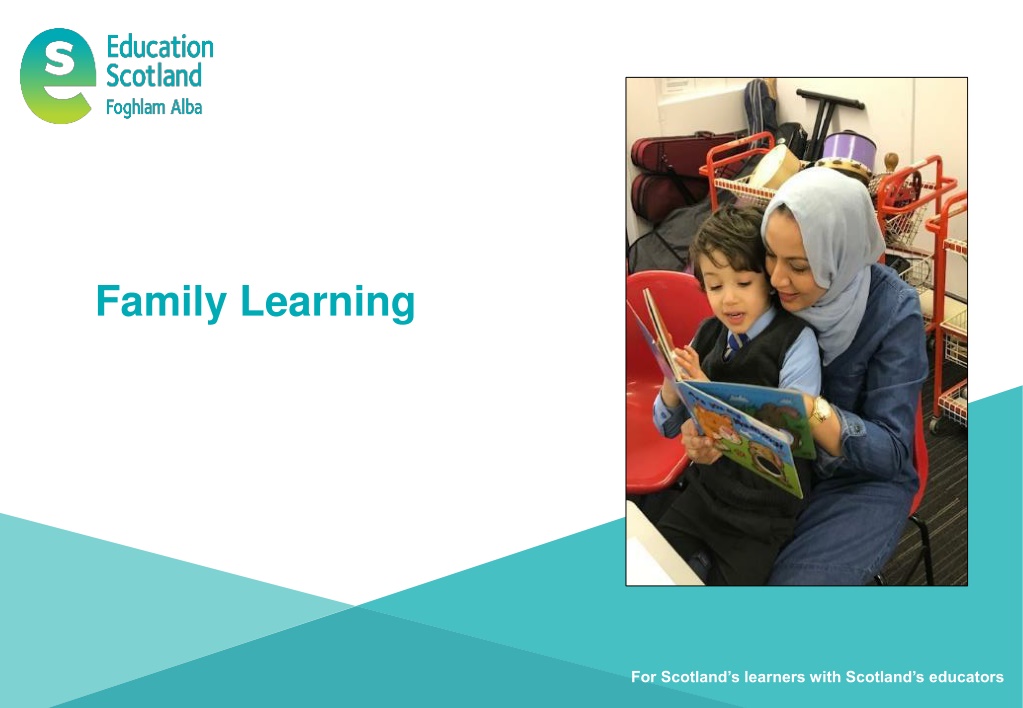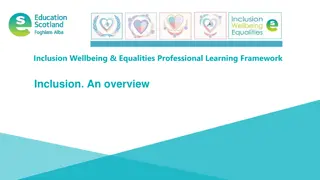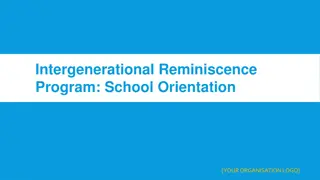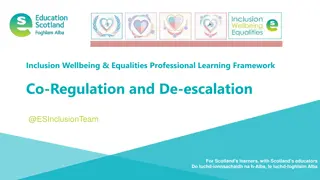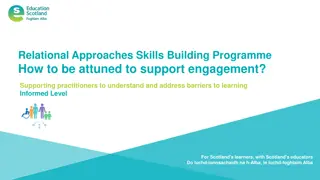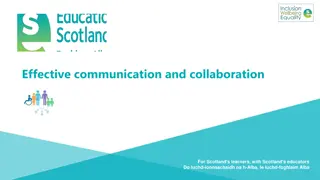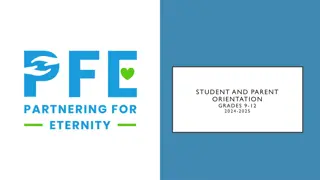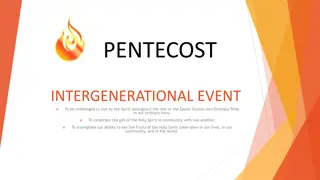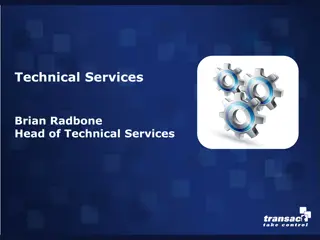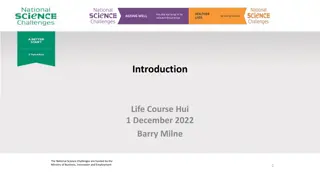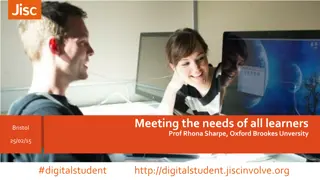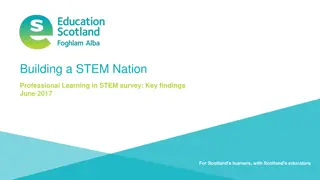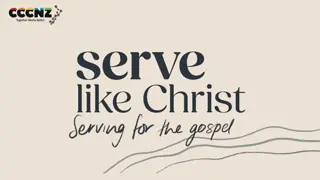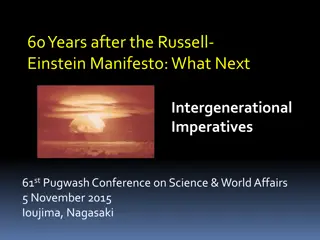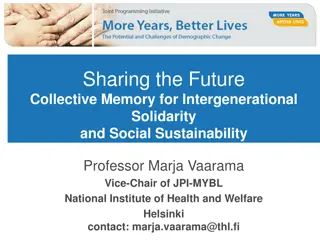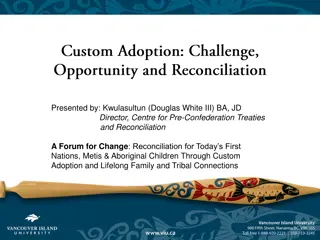Family Learning: Empowering Scotland's Learners Through Intergenerational Education
Family Learning encourages family members to learn together, emphasizing intergenerational learning and support for children's education. It fosters positive attitudes towards lifelong learning, promotes socio-economic resilience, and combats educational disadvantages. Through diversity, mutual respect, and fun learning experiences, Family Learning empowers individuals and communities for a brighter future.
Download Presentation

Please find below an Image/Link to download the presentation.
The content on the website is provided AS IS for your information and personal use only. It may not be sold, licensed, or shared on other websites without obtaining consent from the author. Download presentation by click this link. If you encounter any issues during the download, it is possible that the publisher has removed the file from their server.
E N D
Presentation Transcript
Family Learning For Scotland s learners with Scotland s educators
Definition Family Learning Family Learning encourages family members to learn together as and within a family, with a focus on intergenerational learning. Family learning activities can also be specifically designed to enable parents to learn how to support their children s learning. Family learning is a powerful method of engagement and learning which can foster positive attitudes towards life-long learning, promote socio-economic resilience and challenge educational disadvantage (Family Learning Network, 2016). For Scotland s learners with Scotland s educators
Engaging families in learning A thematic inspection of family learning | National Thematic Inspections | HM Chief Inspector Report | Inspection and review | What we do | Education Scotland For Scotland s learners with Scotland s educators
Key characteristics of Family Learning? Family learning recognises and values diversity of culture, race, relationships and beliefs. Achievements within family learning benefit the wider learning community through promoting change and empowering individuals and communities. Equal partnership is the basis for all developments in family learning: all learners and educators, regardless of generation, recognise that learners and educators can frequently exchange ideas. Family learning raises aspirations and all outcomes of the process, including those which may not be overt, are of equal significance and importance. Family learning operates within a culture of mutual respect for individuals, communities, colleagues and organisations. Family learning recognises the role of the parent as the first educator. Learning can be fun! Family learning recognises that it is acceptable to make mistakes, which are part of the process of reflective learning. Family learning is inclusive and is to be offered as a universal provision with open access. . For Scotland s learners with Scotland s educators
Research on the value of FL to parents shows that opportunities to experience success in learning enables parents to change their literacy, numeracy and communication practices as well as improving their self-confidence and efficacy Gale Macleod & Lyn Tett (2019) The course helped people gain self-esteem and self-confidence which in turn helped parents communicate better with their children and teachers at school. Every person interviewed now takes part in either parent councils or school activities. Dr K Stelfox, P Bain, S Foreman (2017) Family Learning programmes increase the employability of parents/carers whilst also equipping them to support their children s learning and development. (2016) The idea that parents need to be literate and that through the intergenerational transfer of skills and attitudes, the parents' education can influence the subsequent educational achievement of their children, is a foundational belief of contemporary family learning programmes. (Sticht, Towards a Multiple Life Cycles Education Policy , 2007) This study provides evidence that after attending family literacy sessions children improve their literacy skills and there are positive changes in the home literacy environment (2016) Family-centred literacy programmes, however, show that there are immediate benefits as well as a longer-term impact for both children and adults (Brooks et al, 2008; Carpentieri et al, 2011; Hayes, 2006; Tuckett, 2004). For Scotland s learners with Scotland s educators
Family Learning Timeline 1970 s Researchers including Jean Piaget, Martin Hughes, Donaldson, Barbara Tizard, Paulo Freire et al challenged the existing beliefs and understanding of how children and young people learned and interacted with the world around them. 1974 - Sister Doreen Grant, Govanhill area of Glasgow Investigation into the home/school relationship and the impact on attainment and routes out of poverty Parent as first educator The acknowledgement that language is power The central position of dialogue in education For Scotland s learners with Scotland s educators
Parent as first educator (1974) Viewed as a radical idea Parents were part of the problem in underachievement Expected to play a minor role. Get children to school, make them behave and complete homework Parents taught the wrong way . Education was seen as the solution to the poor start in life that a child's home offered Counter to what our education system believes today! For Scotland s learners with Scotland s educators
Language as power (1974) Language development gives children the ability to engage with and understand the world around them Doreen Grant observed that the language code used in schools was different to what they used at home creating a barrier Children were told at school to speak properly which was in direct contrast to their cultural language Some educators believed that working class children suffered from verbal deprivation at home due to a lack of value placed on the language used at home Doreen Grant proposed that schools introduce mutual learning cultures which encouraged the sharing and understanding of how we name and comprehend our world For Scotland s learners with Scotland s educators
Education as dialogue (1974) Traditional dialogue between parent and teacher challenged as one directional Educational terminology created a barrier for some parents to fully understand how to support their child at home Doreen Grant proposed that schools engage in parent-teacher dyad or parent-teacher-pupil triad. Creating a learning opportunity for all involved Developing strong relationships between teacher and home Gave the parents hope and comfort that their child was cared for when they were at school Supported a learning culture within the family For Scotland s learners with Scotland s educators
1980s Strathclyde Region's introduction of Parents as Partners Programme Valuing others Experienced based learning Providing opportunities for interactive language Using the plan/act/reflect cycle of learning collaboration Introduction of negotiated learning for families based on needs and interests Emphasis placed on building relationships Strong focus on partnership working across sectors For Scotland s learners with Scotland s educators
1990s New Community Schools Programme Cross sectoral holistic approach Excellence in Schools white paper (DfEE, England and Wales) Support for utilising a clearly defined family learning approach Underpinned by a robust research and development arm (NIACE) Scottish Government - Devolution For Scotland s learners with Scotland s educators
Family Learning Timeline 2000's See notes below for hyperlinks to documents
What is the difference between Parental Engagement and Family Learning? Family Learning focuses on: Parental Engagement focuses on: wider life of the setting or school within the family and involved in the of each individual with their child s learning that meets the needs actively engaged a learning outcome Supporting parents to become Engaging families in For Scotland s learners with Scotland s educators
Family Learning from planning to evaluation Planning: (Not a solo exercise) 1. Identify need. This can be done in a variety of ways. Some of these include: Talk to families, outreach service Attainment figures Scottish Neighbourhood Statistics Partner Agencies such as Housing, Third Sector, CLD 2. Identify partner agencies. These can be for direct delivery of the programme or referral routes. Some of these will include: Family Learning Teams CLD/Adult Learning Third Sector NHS/Social Work The Promise Libraries/Museums and Galleries For Scotland s learners with Scotland s educators
Family Learning from planning to evaluation (Cont.) Planning: 3. Develop a Single Outcome Agreement (SOA) and or a partnership agreement. These will set priority outcomes and how partners will work towards achieving them. SOA s will also show how the local priorities contribute to the national priorities. 4. Identify appropriate programme or develop one as appropriate. Family's needs should be at the centre of this process. 5. Create a robust engagement plan. This should be multidimensional and incorporate partners existing relationships with families. 6. Costings In kind or funding 7. Progression pathways For Scotland s learners with Scotland s educators
Family Learning from planning to evaluation Engagement Engagement can be difficult but a vital part of the process. 1. Trust is key. This can be the trust that you have developed or that of your partners. 2. Transparency. Families need to believe that there is no hidden agenda. 3. Outreach needs to be soft. 4. Fun. Families engage more when learning is fun for all the family. This is particularly true of pre-learning activities. For Scotland s learners with Scotland s educators
Family Learning from planning to evaluation Programme Delivery Programmes should be evidenced based. If you are developing your own, they should link to current research. Family learning is based on a wealth model. This is about finding out where families are and building on existing skills and knowledge. Make learning relevant. At the start of the programme, you need a baseline measurement so you can compare progress. This can involve gathering information on learners skills, knowledge or abilities so that you can measure their progress at different stages and at the end of the programme. Programmes can be formal or informal. For Scotland s learners with Scotland s educators
Family Learning from planning to evaluation Evaluation Evaluation in family learning is the process of formally identifying the value or success of a programme or learning session. Three questions: How are we doing? How do we know? What are we going to do now? Triangulation (gathering evidence) Self-evaluation includes gathering evidence which can tell us how well we are meeting the needs of those we work with and other stakeholders, and what difference we are making. There are four main sources from which evidence can ultimately be drawn these are: Performance information Relevant documentation Stakeholders views and feedback Direct observations of practice For Scotland s learners with Scotland s educators
How Good is OurFrameworks Designed to promote effective self-evaluation as the first important stage in a process of achieving self-improvement. These resources support establishments, organisations and partnerships to evaluate progress, strengths and areas for development. Family Learning Qi 2.5 For Scotland s learners with Scotland s educators
